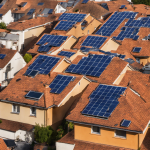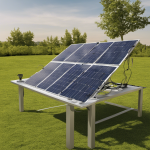
DIY Solar Panels Gain Popularity
The DIY solar panel trend is gaining traction as homeowners seek affordable, eco-friendly alternatives to conventional energy sources. A recent MarketWatch guide highlighted the benefits and challenges of building solar panels at home, empowering individuals to take control of their energy consumption and reduce their carbon footprint.
Global Solar Market on the Rise
According to a Yahoo Finance report, the global solar panels market is expected to grow substantially in the coming years, driven by increasing concerns about climate change and the need for sustainable energy solutions. This trend further fuels interest in DIY solar panels as homeowners seek to benefit from the solar market's expansion.
Making Solar Panels at Home
MSN has detailed the process, emphasizing that while it can be time-consuming and requires technical know-how, the rewards are significant. DIY solar panel builders can save money on their energy bills while contributing to the fight against climate change.
What to Know Before Investing in Solar Panels
Before jumping into DIY solar panels, homeowners should consider a few factors, as outlined by MSN Money. These include assessing the home's solar potential, researching local regulations, and calculating the return on investment. By doing their due diligence, homeowners can ensure they make informed decisions and maximize the benefits of solar energy.
Expert Tips and Resources for DIY Solar Enthusiasts
For those considering the DIY solar panel route, gathering resources and guidance from experts in the field is essential. Online forums, blogs, and YouTube channels offer a wealth of information to help DIY enthusiasts navigate the solar panel construction process. Connecting with local solar energy groups or attending workshops can provide hands-on experience and valuable networking opportunities.
Incentives and Rebates for Solar Energy Adoption
Governments and utility companies worldwide recognize the importance of solar energy and offer various incentives and rebates to encourage its adoption. Homeowners should research local, state, or federal programs that can help offset the initial costs of installing solar panels. These incentives can make solar power more accessible and affordable for a broader range of households.
The Environmental Impact of DIY Solar Panels
Beyond the financial savings, DIY solar panels offer significant environmental benefits. By generating clean, renewable energy, homeowners can reduce their reliance on fossil fuels and lower their overall carbon emissions. This shift towards sustainable energy sources plays a crucial role in mitigating the effects of climate change and preserving our planet for future generations.
The Future of Solar Energy and DIY Solar Panels
As solar technology continues to advance, the efficiency and affordability of solar panels will likely improve, further encouraging the adoption of solar power in homes and businesses. The DIY solar panel movement is poised to play a vital role in this transition, empowering individuals to take control of their energy needs and promote a greener future.
The surge in interest in DIY solar panels reflects a broader movement towards sustainable energy solutions. By investing in solar power, homeowners can save money, reduce their environmental impact, and contribute to the global effort to combat climate change. As solar technology evolves and becomes more accessible, the potential for a cleaner, greener future grows increasingly bright.
In conclusion, the growing popularity of DIY solar panels and the rising solar market indicate a shift towards sustainable energy solutions. As more individuals embrace the potential of solar power, the impact on the environment and the global fight against climate change becomes increasingly significant.

Lucy Davis is an enthusiastic and passionate young writer who has a knack for bringing stories to life. With a fresh perspective and an insatiable curiosity, she delves into the world of smart home technology, interior design, and lifestyle trends, keeping readers engaged and informed.















